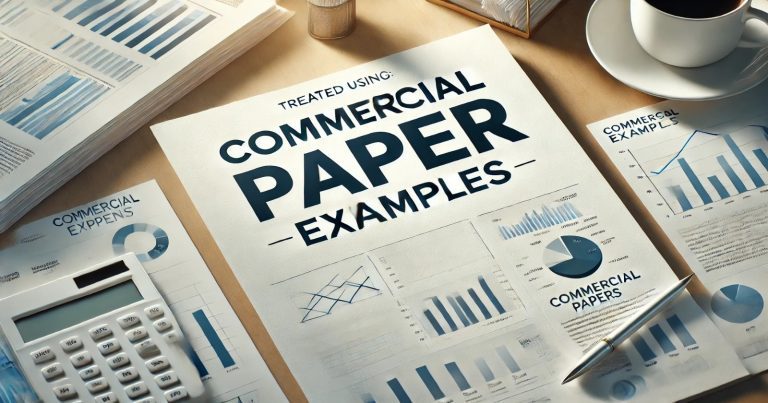Commercial papers are one of the most significant instruments in corporate finance, and they provide flexible ways for the firm to secure short-term funds. A commercial paper is an unsecured, short-term debt issued by corporations used for working capital purposes. Commercial paper examples highlight how top corporations utilize this short-term debt instrument to meet immediate financial needs.These financial instruments have become a cornerstone of the money market, offering an alternative to traditional bank loans. CPs cater to entities needing quick and cost-effective funding, and their issuance is closely regulated to ensure market stability and investor confidence.
Meaning of Commercial Paper
A commercial paper is a money-market security issued by large corporations to secure short-term financing. Typically, these instruments mature within a period of 1 to 270 days and are issued at a discount to their face value. They are unsecured, relying on the creditworthiness of the issuer. Commercial paper is a widely used financial instrument in the money market, designed for short-term borrowing needs of large corporations. It is issued without collateral, relying solely on the issuer’s creditworthiness.
- No collateral backs commercial papers, making them a high-risk option for lenders.
- They act as a cost-efficient substitute for companies’ bank loans.
- Available in denominations of ₹5 lakhs or more in India.
Characteristics of Commercial Paper
Commercial papers possess specific characteristics that distinguish them from other financial instruments.
Huge Credit Quality Requirement
- Only organizations having a high credit rating can issue CPs. This gives assurance to investors regarding their ability to repay.
- It has a short maturity period, ranging between 7 days to a maximum of 270 days, thus providing short-term liquidity.
Discounted Issuance
- CPs are issued at a discount to their face value. For example, a paper with a face value of ₹1 crore might be issued at ₹97 lakhs.
- Since CPs do not carry any collateral, only financially sound companies can utilize them.
Tradability
These instruments are very highly tradable in the secondary market, thus improving the liquidity for the investors. Only corporations, Primary Dealers, and financial institutions, as per RBI norms, can issue commercial papers.
Who Can Issue a Commercial Paper in India?
The Reserve Bank of India (RBI) issues the commercial paper under controlled guidelines.
Eligible Issuers
- Corporate entities with a net worth of ₹4 crores and above.
- Non-banking Financial Companies
- All-India Financial Institutions
Conditions for Issuance
- The company needs to have a high rating for example A1+
- They should follow RBI guidelines. Issue documents required for filings with the stock exchanges.
- Denominations should be in quantities of ₹5 lakhs or multiples thereof.
Types of Commercial Paper
Commercial papers can be classified based on usage and structure.
- Promissory Notes: These are traditional CPs wherein the issuer promises to pay the amount specified at maturity.
- Asset-Backed Commercial Papers (ABCPs): Asset-backed commercial papers reduce the risk of the investor on the basis of assets owned by the issuer.
- Euro Commercial Papers (ECPs): It is issued in international markets, ECPs cater to global investors and are usually denominated in foreign currencies.
- Directly Placed CPs: Issued directly to investors without involving intermediaries, making the process cost-efficient.
- Dealer-Placed CPs: Here, financial dealers or brokers mediate the issuance process, enhancing market reach.
Advantages of Investing in Commercial Paper
Investors prefer CPs due to their unique benefits.
- High Liquidity: With short maturities, CPs provide quick returns, making them suitable for short-term financial planning. CPs typically have better yields than a savings account or a Treasury bill.
- Low Risk for High-Rated Issuers: For creditworthy issuers, the default risk is extremely low. The issuer need not pledge any assets; this ensures that it can remain operational and carry on with business without hindrance
- Diversification: Investing in CPs provides portfolio diversification with the inclusion of corporate debt instruments.
Disadvantages of Investing in Commercial Paper
Though CPs offer many benefits, they do come with a number of risks.
- Unsecured Nature: With no collateral involved, the likelihood of default increases, especially with lower-rated issuers. The large denominations mean that CPs are available mainly to institutional investors or high-net-worth individuals.
- Market Sensitivity: CP value changes with changing interest rates and market conditions. Investors are subject to the risk of the issuing corporation’s financial stability.
- Not Suitable: The CP is not applicable to long-term objectives since it has a very short maturity.
Commercial Paper Examples
Commercial paper examples showcase how leading corporations effectively use this financial tool to address short-term liquidity needs. These real-world cases highlight the flexibility and efficiency of commercial papers in corporate financing.
Reliance Industries Limited
- Commercial Papers issued by Reliance Industries, India’s largest diversified conglomerate, amounted to ₹2,000 crores. The motive was to address short-term liquidity demands, including raw material purchases, vendors’ payments, and daily operation expenses.
- Reliance frequently uses CPs to stay away from reliance on bank loans, ensuring low cost as well as timing of funding.
HDFC Bank
- HDFC Bank is one of the leading banking companies in India. It issues commercial papers to bridge the gaps in funding its operations.
- For example, the bank issued CPs to raise ₹1,500 crores to meet its immediate cash flow requirements while waiting for loan repayments from its customers. This enables HDFC to maintain uninterrupted operational efficiency.
Tata Steel
- Tata Steel has issued CPs amounting to ₹500 crores to raise funds for purchasing raw materials such as iron ore and coal, which are essential for the continuous production of steel.
- The fact that the company was able to issue CPs points to its solid credit profile and market confidence in its stability.
Infosys
- Infosys, a leading IT services company worldwide, raised funds for short-term projects such as the development of cloud computing infrastructure through commercial papers.
- The ₹400 crores it raised from CPs were used to manage payroll, invest in technological upgrades, and ensure timely delivery of services to global clients.
ICICI Securities
- ICICI Securities, one of the leading providers of financial services, raised ₹800 crores through CPs. The amount was used to expand the business in the short term by financing marketing campaigns aimed at attracting new clients and boosting their portfolio management services.
- The company thereby increased its market share and optimized its cost of capital.
Aditya Birla Finance Limited
- Being a significant player in the NBFC space, Aditya Birla Finance Limited raised CPs worth ₹300 crores.
- The collected amount was channeled into lending to SMEs to increase the loan book, which helped increase its market share while catering to the increasing order book.
L&T Financial Services
- Through CPs, L&T Financial Services, a leading subsidiary company of Larsen & Toubro, was able to raise ₹600 crores.
- This will be used to cater to infrastructure financing related to road construction as well as renewable energy projects. This will mean no financial bottlenecks to keep projects rolling.
State Bank of India (SBI)
- SBI, India’s largest public sector bank, issued commercial papers to meet its short-term funding requirements for inter-bank lending and operational liquidity.
- For instance, the ₹1,000 crores raised helped the bank cover temporary cash flow mismatches, ensuring smooth banking operations and enhanced customer service.
Commercial Paper Examples FAQs
What is the difference between commercial paper and Treasury bills?
Commercial papers are issued by companies and are unsecured. Treasury bills, on the other hand, are issued by the government and carry no risk.
Who buys commercial papers?
Institutional investors include banks, mutual funds, and insurance companies.
Are commercial papers safe investments?
They are safe when issued by high-rated companies but are risky because they are unsecured.
What is a Euro Commercial Paper?
A Euro Commercial Paper is a CP issued in international markets, which is usually expressed in foreign currencies.
What are asset-backed commercial papers?
These are CPs backed up by assets and therefore reduce risk for investors.


